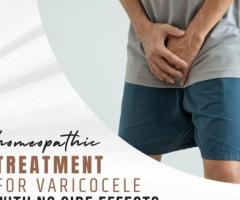Varicocele can be described as a medical condition characterised by vein enlargements inside the scrotum. It is similar to the varicose venous conditions that affect the legs. This condition mainly affects the veins leading to the testicles. Most commonly, it is found in men aged 15-25. While varicoceles, in most cases benign, can cause discomfort. They may also affect fertility. This comprehensive guide will examine the causes and symptoms associated with varicoceles, as well as non-surgical remedies such as varicocele treatment in homeopathic medicine.
Signs and Symptoms of Varicocele:
Pain and discomfort: The most common symptom is a dull pain or discomfort around the scrotum. This pain may worsen during t...
Varicocele can be described as a medical condition characterised by vein enlargements inside the scrotum. It is similar to the varicose venous conditions that affect the legs. This condition mainly affects the veins leading to the testicles. Most commonly, it is found in men aged 15-25. While varicoceles, in most cases benign, can cause discomfort. They may also affect fertility. This comprehensive guide will examine the causes and symptoms associated with varicoceles, as well as non-surgical remedies such as varicocele treatment in homeopathic medicine.
Signs and Symptoms of Varicocele:
Pain and discomfort: The most common symptom is a dull pain or discomfort around the scrotum. This pain may worsen during the day and especially after prolonged periods spent standing or performing physical activities.
Testicular Atrophy: Varicoceles, in certain cases, can lead to a shrinking of the testicle. This might result in an apparent variation in the sizes of both testicles.
Another symptom is swelling or a lump on the scrotum. The swelling could become more noticeable over time.
Visible Veins. Dilated, visible veins may be palpable. These veins are often described by patients as feeling like "a bag of worms."
What causes Varicocele:
Faulty vein valves: Valves that regulate blood flow are believed to be the main cause of varicocele. When these valves cannot function properly, blood accumulates in the veins, and they become enlarged.
Genetic Predisposition. Certain people may have varicoceles because of their genes. A family with a history of varicoceles increases the chances of developing the illness.
Varicoceles can develop due to abnormal anatomy of the veins in the spermatic cord.
Non-surgical Treatment options:
Home remedies for Varicocele
Varicocele Home Remedies include:
Scrotal Lift: Supportive underwear or a scrotal lift can provide relief by reducing the pressure on your veins.
Cold Compresses - Applying a compress of cold water to the affected region can help reduce inflammation and pain.
Homeopathic Treatment and Medicines of Varicocele
When it comes to varicocele natural treatment, homeopathy is considered best. Homeopathic medicines are recommended for their anti-inflammatory properties. They may reduce swelling and pain caused by varicocele. They may have certain characteristics that may help to strengthen vein walls. The homeopathic doctor will closely monitor your improvement and modify your treatment plan as necessary.
Natural Treatment Options for Varicocele
Dietary Changes - Adopting foods that are rich in antioxidants, anti-inflammatory food and other nutrients may help support overall cardiovascular health.
Regular Exercises: Engaging regularly in physical activities can promote healthy blood flow and prevent the progression of varicocele.
Herbal supplements. Certain herbal products are believed to contain venotonic compounds that may reduce symptoms related to varicocele.
Conclusion:
Varicocele may affect men of any age and can be uncomfortable. It could also cause fertility problems. Although there are surgical options for treating varicocele, other testicular varicocele treatment without surgery options, such as homeopathy and homeopathic medicine, can be used to manage symptoms. Patients with symptoms of varicocele must consult a health professional to determine what is the best medicine for varicocele. This will depend on both their medical history and condition.



